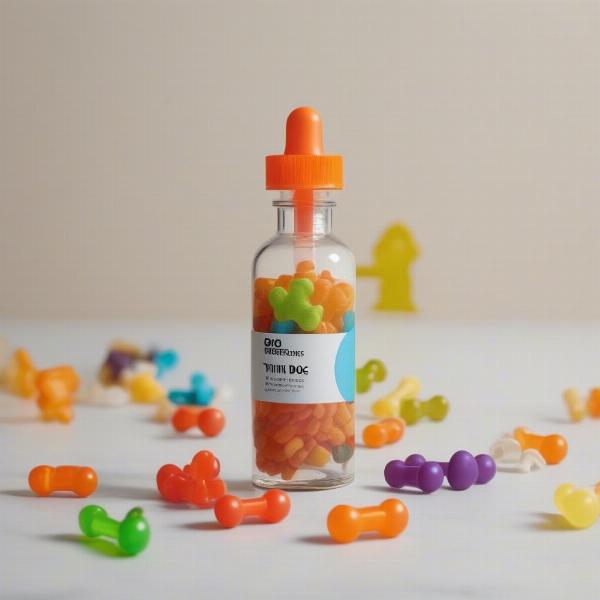Dog vitamins are essential supplements that can help bridge nutritional gaps in your dog’s diet, supporting their overall health and well-being throughout their life stages. From promoting healthy skin and coat to boosting the immune system and supporting joint health, understanding the role of dog vitamins is crucial for every responsible pet owner. Choosing the right vitamins can be confusing, so this guide will help you navigate the world of canine supplements and make informed decisions for your furry friend.
Understanding the Importance of Dog Vitamins
Just like humans, dogs require a balanced diet to thrive. While a high-quality dog food should provide most of the necessary nutrients, certain factors like age, breed, activity level, and health conditions can influence their specific needs. Dog vitamins can complement a balanced diet, ensuring your pet receives the optimal levels of essential nutrients for optimal health. They can also address specific health concerns, such as joint pain, skin allergies, or weakened immunity.
Choosing the Right Dog Vitamins for Your Canine Companion
Selecting the right dog vitamins requires careful consideration of your dog’s individual needs. Factors such as age, breed, size, and overall health should be taken into account. Puppies, for example, require different vitamins than adult or senior dogs. Similarly, large breeds may have different joint health needs compared to smaller breeds. Consulting your veterinarian is always the best approach to determine the most appropriate vitamins and dosages for your dog. They can assess your dog’s health and dietary needs and recommend specific supplements accordingly.
Key Nutrients to Look For
Essential vitamins for dogs include vitamins A, C, D, E, and K, along with B vitamins. These vitamins play vital roles in various bodily functions, including vision, bone health, immune function, and cell protection. Look for dog vitamins that contain a balanced blend of these essential nutrients.
Different Forms of Dog Vitamins
 Different forms of dog vitamins – chewable and liquid
Different forms of dog vitamins – chewable and liquid
Dog vitamins are available in various forms, including chewable tablets, capsules, powders, and liquids. liquid dog vitamins can be easily mixed with food or administered directly, while chewable tablets are often more palatable for picky eaters. Consider your dog’s preferences and ease of administration when choosing the best form.
Common Misconceptions About Dog Vitamins
Some pet owners believe that if their dog eats a complete and balanced diet, they don’t need additional vitamins. While a good quality diet is crucial, supplementation can still be beneficial, especially for dogs with specific health needs or those who are picky eaters. dog vitamins and supplements should be seen as a way to enhance, not replace, a healthy diet. Over-supplementing can also be harmful, so always follow your veterinarian’s recommendations.
Monitoring Your Dog’s Response to Vitamins
After starting your dog on a vitamin regimen, closely monitor their response. Look for improvements in their coat, skin, energy levels, and overall well-being. If you notice any adverse reactions, such as digestive upset or skin issues, discontinue use and consult your veterinarian. dog vitamins for older dogs often address specific age-related concerns. Remember, individual responses to vitamins can vary, and finding the right balance for your dog may require some adjustments.
Conclusion
Providing your dog with the right vitamins can significantly contribute to their overall health and longevity. By understanding their nutritional needs and choosing appropriate supplements, you can help your canine companion thrive. Remember to consult with your veterinarian for personalized advice and to ensure the safety and effectiveness of any vitamin regimen. nuvet dog vitamins are one of the many brands available. Choose wisely based on your veterinarian’s recommendations.
FAQ
- Do all dogs need vitamins? Not necessarily, but many can benefit from them. Consult your veterinarian to determine if your dog needs supplements.
- Can I give my dog human vitamins? No, human vitamins can be toxic to dogs. Always use vitamins specifically formulated for canines.
- How do I choose the right vitamins for my dog? Consider your dog’s age, breed, size, and health conditions. Your veterinarian can provide tailored recommendations.
- What are the signs of vitamin deficiency in dogs? Signs can include poor coat condition, skin issues, lethargy, and weakened immunity.
- Can I give my dog too many vitamins? Yes, over-supplementation can be harmful. Always follow the recommended dosage.
- Are there any side effects of dog vitamins? Some dogs may experience mild digestive upset. Consult your vet if you notice any adverse reactions.
- How do I store dog vitamins? Store them in a cool, dry place away from direct sunlight.
ILM Dog is a leading international online resource dedicated to providing expert advice and valuable information on all aspects of dog care and wellbeing. From breed selection to nutrition and training, we offer a wealth of resources for dog owners worldwide. We are passionate about helping you provide the best possible care for your furry friend. For personalized advice on dog nutrition, training, or any other dog-related concerns, contact our team of experts. Email: [email protected]. Phone: +44 20-3965-8624. Connect with ILM Dog today and discover a wealth of information to help your canine companion thrive.